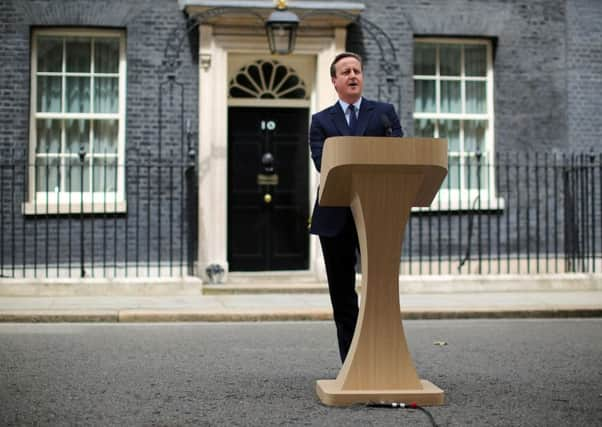Ian Swanson: How will we get over all the bitterness and bile?


THE tone of the campaign was supposed to change following the cruel and tragic death of Labour MP Jo Cox. Her murder united politicians across the parties not only in grief but also in calling for less bile and bitterness in public debate and social media.
The prospect of more measured, honest and respectful exchanges was one welcomed by voters at large, who felt the referendum debate had got out of control.
Advertisement
Hide AdAdvertisement
Hide AdBut the rhetoric, at least from some, does not appear to have improved much. When the campaigning resumed after a brief pause, Nigel Farage was quickly accusing the Remain camp of using Ms Cox’s death to smear the Leave side.
If the legacy of the Scottish independence referendum was a heightened interest in politics and greater engagement in the political process, it looks like the legacy of the EU vote could be new depths of viciousness and abuse.
And on the eve of the decision, with the result looking still very much in the balance, it is worth recalling why this referendum is taking place.
There is no need for it. David Cameron pledged an In-Out vote because he wanted to see off the supposed threat from Ukip and anti-European Tory rebels.
Advertisement
Hide AdAdvertisement
Hide AdEssentially, the referendum was intended to solve a problem inside his own party. But now it is creating a worse one.
Some of the fiercest exchanges in the debate have been the “blue on blue” attacks – senior Tories laying into colleagues with no holds barred.
Whatever the result, Mr Cameron will come out of the referendum at the head of a party whose divisions have been intensified and entrenched by the debate on the EU.
His own future will be in doubt and the contest to succeed him – whether sparked by his immediate departure or taking place in his own good time – will be a new battle between Europhiles and Brexiteers.
Advertisement
Hide AdAdvertisement
Hide AdAnd if Leave loses tomorrow, especially by a narrow margin, just wait for those demands for a second referendum on UK membership.
But the referendum will also leave Mr Cameron as Prime Minister of a divided country. A YouGov map of the UK colour-coded to illustrate the varying strength of support for each camp shows Scotland mostly for Remain while south of the Border, only London and a few isolated pockets of England and Wales were of the same view.
Scotland has not entered into the EU debate with anything like the gusto seen in the independence referendum two years ago. And the campaign here has been noticeably less eventful than south of the Border.
Although the gap between Remain and Leave seems to have narrowed in Scotland, another survey shows 62.8 per cent support in Edinburgh for staying in compared with 20.7 per cent for leaving and 16.5 per cent undecided. Only London had stronger Remain support at 66.9 per cent.
Advertisement
Hide AdAdvertisement
Hide AdBut even if the result is not as dramatic as the scenario of a Brexit vote in England and a Remain vote in Scotland, potentially opening the door to a second independence referendum, the whole EU debate has underlined different political outlooks north and south of the Border.
Perhaps it was always too much to expect those who have got accustomed to voicing their strong views in extreme language to rein in their abuse ahead of the vote.
But attempts to create the kinder politics people hoped for could be more important than ever to handle the divisions ahead.